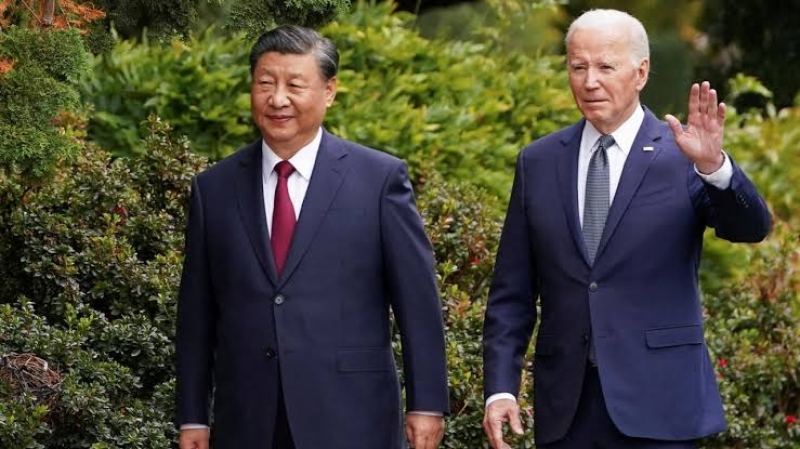- Can Dhaka’s arms recovery drive ensure peaceful polls? |
- ‘Unhealthy’ air quality recorded in Dhaka Monday morning |
- BD peacekeepers' deaths: UN chief calls Dr. Yunus, offers condolence |
- Bangladesh Plans Rockets, Satellites, and Space Industrial Park |
- India willing to work together inspired by shared sacrifices of past |
Biden, Xi Attend APEC Summit Ahead of Key Meeting Amid Uncertainty

US President Joe Biden and Chinese President Xi Jinping will participate in the first day of an Asia-Pacific summit in Lima on Friday, ahead of an anticipated face-to-face meeting on Saturday. This will likely be the final direct talks between the leaders of the world’s two largest economies before former President Donald Trump takes office again in January, following his victory in the recent election.
With Trump signaling a more aggressive stance toward China in his second term, their upcoming meeting is expected to draw significant attention, particularly as the new administration’s foreign policy approach remains uncertain. Trump has vowed to confront Beijing over trade imbalances, which could result in escalated tensions between the US and China.
Biden and Xi arrived in Lima on Thursday for the Asia-Pacific Economic Cooperation (APEC) summit, a two-day gathering that brings together 21 economies representing nearly 60% of global GDP. The forum, launched in 1989 with the goal of advancing regional trade liberalization, will focus on trade and investment in a bid to foster "inclusive growth."
However, the looming uncertainty surrounding Trump's policies is casting a shadow over the discussions, with additional concerns about global challenges such as the COP29 climate talks in Azerbaijan and the upcoming G20 summit in Rio de Janeiro next week.
Ahead of the summit, APEC ministers, including US Secretary of State Antony Blinken, held a closed-door meeting to set the stage for the leaders’ discussions. Trump’s recent announcement that he plans to replace Blinken with Senator Marco Rubio, a vocal critic of China, signals a likely shift toward a more confrontational approach to Beijing under his administration.
The 'America First' Agenda
The summit will also feature leaders from Japan, South Korea, Canada, Australia, and Indonesia, though Russian President Vladimir Putin will not be attending. Trump’s "America First" agenda, which prioritizes protectionist trade policies, the expansion of domestic fossil fuel production, and disengagement from foreign conflicts, poses challenges to the alliances Biden has forged over the past years. These alliances cover a range of issues, from the wars in Ukraine and the Middle East to climate change and global commerce.
Trump has specifically threatened to impose tariffs as high as 60% on Chinese goods, claiming that such measures would address what he perceives as unfair trade practices. While this could deepen China’s economic struggles, particularly amid a prolonged housing crisis and slow consumption growth, economists warn that a trade war could also harm the US economy, with global repercussions.
Rising Tensions and Strategic Realignments
Beyond trade, geopolitical tensions are also in focus. China, which shares strong ties with Russia and North Korea, continues to expand its military capabilities and assert pressure on Taiwan, which it views as part of its territory. China’s global influence is also growing through its Belt and Road Initiative, including strategic investments in Latin America.
On Thursday, Xi inaugurated South America's first Chinese-funded port in Chancay, Peru, underscoring China’s expanding economic footprint in the region. Meanwhile, a senior US official cautioned Latin American countries to be vigilant about Chinese investments, warning of potential long-term strategic risks.
In contrast, President Biden is set to meet with Japanese Prime Minister Shigeru Ishiba and South Korean President Yoon Suk Yeol on Friday. These meetings are expected to reinforce US alliances in Asia, with Biden’s National Security Advisor, Jake Sullivan, announcing the creation of a new secretariat designed to ensure the lasting strength of the trilateral partnership between the US, Japan, and South Korea.
Threats Beyond China
Trump’s economic focus isn’t limited to China. The incoming president has also targeted Mexico, another APEC member, with threats of 25% tariffs on Mexican imports unless the country takes stronger action against drug trafficking and immigration. This move would disrupt trade relations with Mexico, a key economic partner of the US.
Meanwhile, Peru, the host country of the APEC summit, has deployed over 13,000 troops to maintain security in Lima, as protests against crime and government neglect have erupted in the capital. These protests highlight growing domestic instability, further complicating the international environment in which these high-level discussions are taking place.
As the summit continues, all eyes will be on the key bilateral talks between Biden and Xi, as well as the broader implications of a shifting geopolitical landscape and the potential for new economic and security policies under a Trump administration.

